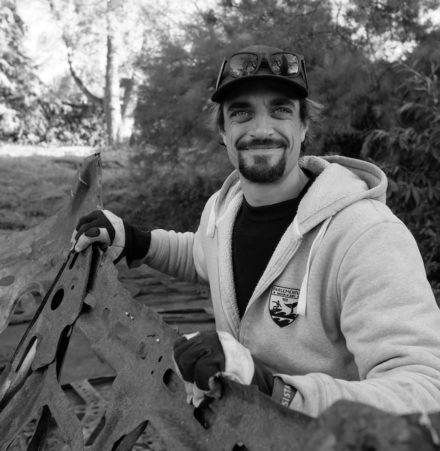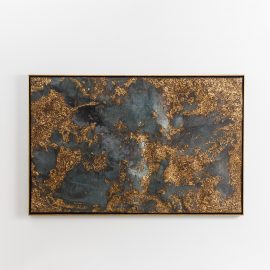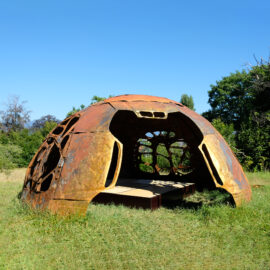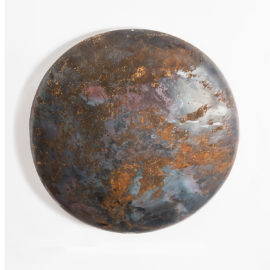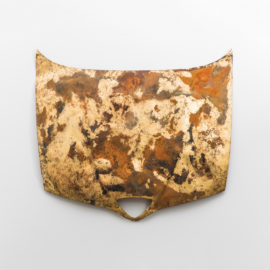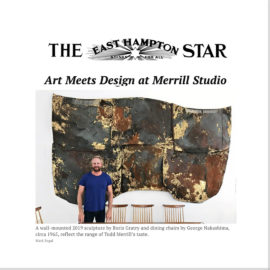Todd Merrill Studio began representing Swiss artist Boris Gratry in 2019. Gratry’s abstract compositions share as unique a kinship to artists like Richard Serra or John Chamberlain, as they do with raku-ware, a traditional pottery used in Japanese tea ceremonies.
Strongly influenced by conceptual art, specifically the radical Italian art movement Arte Povera, Gratry has devised a primary aesthetic embodied in the fight against consumerism. In transforming auto parts, one of consumerism’s most ubiquitous products, his works are largely improvisational; the outcome of a number of insurgent factors.
Gratry hosts large happenings during which car parts, like hoods and doors, are set on fire and then violently cooled with water. This process of temperature shocking produces a number of reactions, from changing the object’s initial shape to altering its materiality, as well as making it susceptible to rust. Variations in temperature dictate the metal’s initial coloration, which is then allowed to rust before being embellished with gold leaf appliqué.
Essential in Gratry’s work is the appreciation for the imperfection and evolution of each piece. The works could be described as beautifully tortured, but the most substantial artistic decisions are dictated by natural elements – the chemical and physical reaction to the fire, the eventual patina – which are merely coaxed along by the artist. Gratry’s axiom closely follows the Japanese perspective of “wabi-sabi” which is centered around the acceptance of evanescence and imperfection. The alteration of time is perceived as a benefit where the beauty of the patina will add value and charisma to the work of art as well as a unique authenticity.
Furthermore, Gratry’s use of gold leaf to ornament his works, references “kintsugi,” the Japanese art of repairing broken pottery with gold, thereby preserving and highlighting the breakage as an essential part of the object’s history. The golden scar is an emphasis for the passage of time, a rebirth as well as the beginning of a new cycle.
Throughout Gratry’s work, an underlying idea of opposing forces challenges our notions of desirability. In using destructive force, an icon of mass-production is made unique; the banal, rendered exciting, simple, and beautiful.
Swiss-born with Russian descent, Boris Gratry is an interior designer and a scenographer exploring the boundaries of conceptual art. Earning his professional degree in Interior Design at the Geneva School of Art and Design, he followed with a bachelor of arts in Exhibition and Stage Design from the Institute of Interior Design and Scenography in Basel. During his studies, he collaborated and led projects with “Group8″ Architects (Art Basel 2010, ICRC logistic complex). He was then hired at the international exhibition design studio in Stuttgart, Atelier Brückner, in the competition department with projects such as Frankfurt’s BMW museum. He joined the Geneva Opera House as Assistant stage manager for Umberto Giordano‘s “Andrea Chenier” and Mozarts‘s “Abduction from the Seraglio”.


